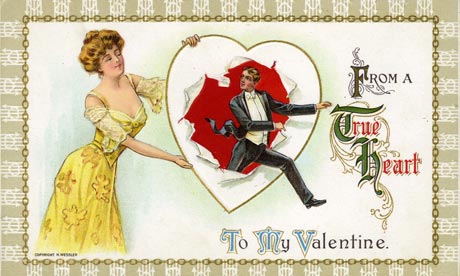Why we should be wary of this remnant of Victorian sentimentality
The Guardian February 2010
 | |||||
| A sentimental token: a Valentine's Day card from the early 20th century. Photograph: Transcendental Graphics/Hulton Archive |
For chocolatiers, jewellers, restaurateurs and greeting card manufacturers, Valentine's Day is, after Christmas, the most lucrative moment of the year. But this year the outlook is not very good. For one thing, Valentine's Day falls on a Sunday, when there are no postal deliveries, which can't encourage the sending of cards. And men are increasingly reluctant to send cards. According to a survey carried out by Lindt chocolates, many of the men who would once have sent cards now prefer to declare their love by text message or email. Women's expectations of male gallantry have also fallen very low, for the survey finds that two-thirds of them expect to share the cost of their Valentine's Day dinner out, while only a third will be surprised if they have to "go Dutch".
Given that Valentine's Day is a creation of the sentimental Victorian era and based on the flimsiest of traditions, rooted in an obscure reference by Chaucer to the saint's day of an obscure early martyr who had no known interest in love or romance, it is surprising that, according to the US Greeting Card Association, about 1bn Valentine's cards are sent throughout the world each year, fewer only than at Christmas. This must be due to the huge exploitation of Valentine's commercial possibilities, especially in the US. Even a staid old newspaper such as the New York Times runs dozens of articles about what to do, what to buy, what to eat and how to behave on Valentine's Day. It also defers to the modern sexualisation of a festival that, in Victorian times, was seen as a celebration of innocent love, often involving children.
One article in the New York Times this week, headlined "A Viagra alternative to serve by candlelight", was about foods with aphrodisiac qualities that might help "to bring Valentine's Day dinner to a satisfying conclusion". It cited earnest scientific research to support its findings, which were not on the whole encouraging. Chocolate, for example, would have an aphrodisiac effect only on someone who ate 25lb of it at one sitting; and while the smell of doughnuts could heighten a man's sexual response, it would only achieve this if combined with the smell of liquorice.
With all this emphasis on sexual activity, one can see why Ashcombe primary school in Weston-super-Mare – described as "killjoy" in the Daily Mail – has banned Valentine cards among its pupils on the grounds that they are not yet "mature enough emotionally and socially to understand the commitment involved in having or being a boyfriend or girlfriend".
When I was young, Valentine cards were usually sent anonymously. I thought they had been invented to allow shy or unattractive men to express a love that they knew could never be requited. For their recipients, the excitement was trying to guess what poor creature had sent them. Now they seem to be more about the reaffirmation of an existing relationship, which could be more convincingly achieved in almost any other way.
Still, Valentine's Day remains people's favourite day for proposing marriage, and it was the day on which Lakhvinder Cheema and his fiancee planned to get married last year if they had not been poisoned just weeks earlier by his former lover. At around the same time, a Muslim cleric went on Egyptian television to denounce "the Valentine virus" as more dangerous than Aids, Ebola or cholera. It was, he said, a virus that was "about to attack the hearts of the nation's youth, and to destroy our relations with God". I wouldn't go quite as far as that.
Why love is for the birds
If I were a single woman, which I am not, and a believer in ornithomancy, which I am not either, I might look forward to Sunday morning to determine my marital prospects. For it is alleged that the first bird I see on Valentine's Day will tell me what kind of man I will wed. In what sounds like a desperate effort to drum up more tourism, the county of Worcestershire is promoting bird-watching as a cure for loneliness for unmarried women.
Its tourism department, claiming to have consulted "experts" worldwide, has published a list of birds and their supposed omens. If you see a blackbird, your future husband will be a vicar or an aid worker. If it's a hawk, he will be a politician or a businessman. If it's an owl, he'll most probably be an academic. Let's hope you see a kingfisher, for in that case your husband will be rich; and not a woodpecker, for in that case you won't get married at all.
Here in Northamptonshire, there is usually a woodpecker outside my window, so I wouldn't recommend my garden to the lonesome woman birdwatcher. And at the moment, I wouldn't recommend it to any birdwatcher at all. For although I have hung a bird-feeder full of enticing seeds on a little tree in full view of my desk, not a single bird of any kind has so far come anywhere near it. I wonder where all the birds have gone.
















0 comments